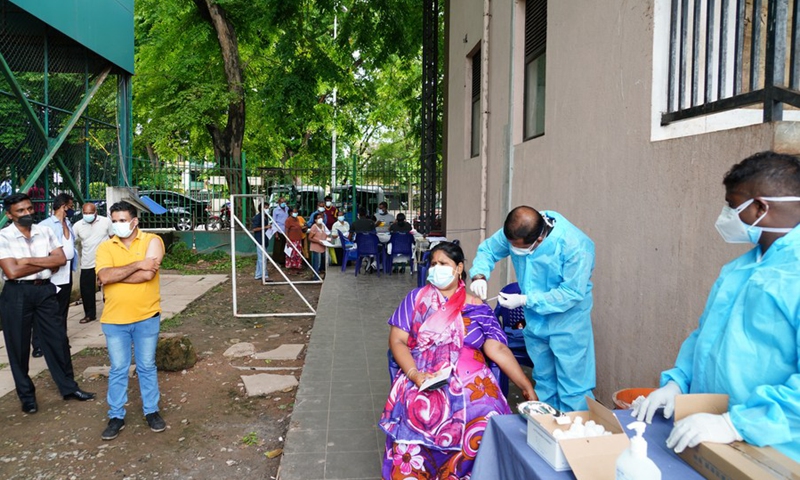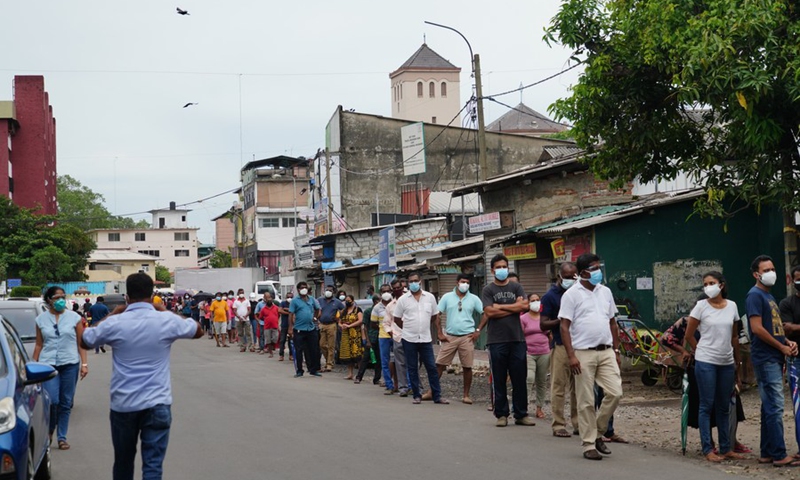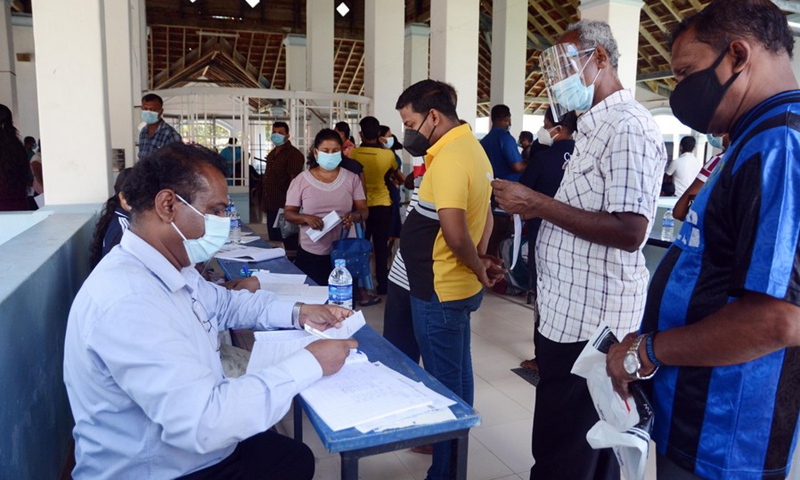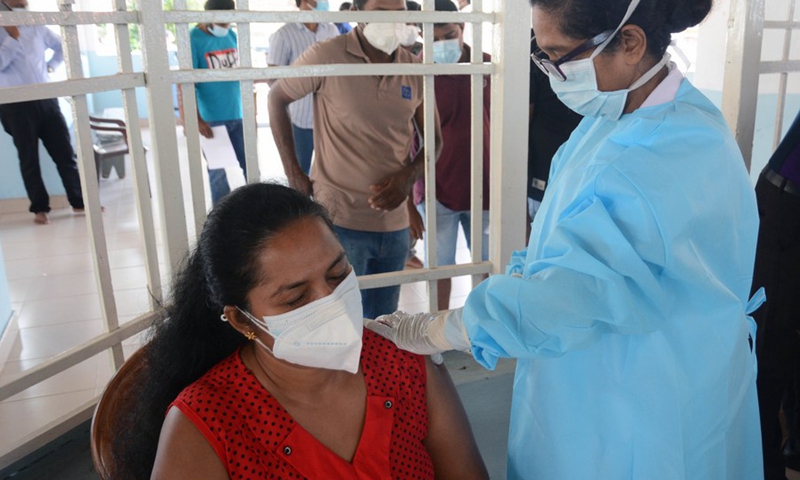As COVID-19 pandemic worsens, Sri Lanka accelerates vaccination program with China's Sinopharm jabs

People receive COVID-19 vaccines at a vaccination center in Sri Lanka's capital Colombo on May 15, 2021.(Photo: Xinhua)

People queue up to receive COVID-19 vaccines outside a vaccination center in Sri Lanka's capital Colombo on May 15, 2021. (Photo: Xinhua)

People wait to receive Chinese Sinopharm vaccine amid severe COVID-19 situation in Gampaha, on the outskirts of Colombo, Sri Lanka, May 10, 2021.(Photo: Xinhua)

A woman receives a dose of Chinese Sinopharm vaccine amid severe COVID-19 situation in Gampaha, on the outskirts of Colombo, Sri Lanka, May 10, 2021.(Photo: Xinhua)
As the number of COVID-19 patients and deaths continue to mount daily in Sri Lanka, long queues are seen outside many centers in the island country where China's Sinopharm vaccines are being administered.
As of Monday, Sri Lanka reported over 142,000 confirmed cases of COVID-19 and 962 deaths. During the first half of May, the number of newly confirmed cases touched 30,000, and the number of deaths increased by nearly 300.
Due to the rapid increase in cases, Sri Lanka is facing a severe shortage of medical resources, including hospital beds as well as medical equipment.
In order to control the spread of the pandemic, the Sri Lankan government imposed an islandwide travel restriction which came into effect from last Thursday night and was lifted in the early hours of Monday.
However during these days, vaccination centers were allowed to function and people eager to get vaccinated were seen flocking to these centers. The government had said that movement restrictions would not apply to those who go out to get the jab. Queues began to form early in the morning.
Sri Lanka is using different brands of COVID-19 vaccines. As a large number of vaccines ordered from abroad could not be delivered on schedule, the vaccination plan was seriously affected. On May 8, the government began using the Sinopharm vaccine in Kalutara, in the south of Colombo, one of the hardest hit areas.
Since then, Sinopharm has become the main vaccine to be used in the island country. Channa Jayasumana, state minister of pharmaceutical production, supply and regulation, said at the launch of the vaccination program that the Sinopharm vaccines will help the Sri Lankan government achieve the goal of vaccinating at least 70 percent of the population by the end of the year.
Sudarshani Fernandopulle, state minister of primary health care, epidemics and COVID disease control, said the best way to protect the country from the COVID-19 virus was to vaccinate the people.
On May 13, the government decided to expand the range of people vaccinated with Sinopharm to those over the age of 60 who did not have complications from other diseases.
Sri Lanka's vaccination program is currently in operation mainly in the most severely affected districts in the Western Province such as Colombo, Gampaha, and Kalutara. About forty vaccination centers have been set up in these areas.
Recently, Xinhua visited five vaccination centers in the capital city of Colombo. The vaccination centers vary in size. Some are located in community health centers, and others are in stadiums or temples. Most of the vaccination centers are manned by the government or by non-governmental organizations, and some are run by the Sri Lankan army.
Medical Officer Dammika Adikariwattage told Xinhua that due to the sharp increase in the number of COVID-19 cases, the public are more eager to get vaccinated than in the past. The community vaccination center under Adikariwattage's jurisdiction can service about 700 people a day. A large center can vaccinate more than 2,000 people a day.
Those wanting to be vaccinated have to fill out forms on the spot, which is then checked by the staff. This is a slow process, with most people having to wait for several hours.
Perera, a local employee standing at the head of the queue said that he had to wait for more than three hours to enter the vaccination center. But he added that it was worth the wait, as he would get vaccinated.
Jinith De Silva, Chairman of the Sri Lanka-China Society, told Xinhua that he is 71 years old and has no physical discomfort after being vaccinated. "My friends are also in good condition after being vaccinated. I think the Sinopharm vaccine is very suitable for our country," he said.
At a vaccination center run by the military, a woman praised the Sri Lankan government's vaccination program. "I am very happy to be vaccinated. This is very well organized. I am really happy I came to get the jab today. The country is in good hands. We are now stress-free," she said.
According to the information from the Ministry of Health, as of May 16, more than 1.315 million had been vaccinated. Of these 375,000 had been given the Sinopharm vaccine.
According to a release from the Chinese Embassy in Sri Lanka, Sri Lankan Prime Minister Mahinda Rajapaksa told the Chinese Ambassador to Sri Lanka Qi Zhenhong on May 12 that Sri Lankans were deeply grateful to China for sending the Sinopharm vaccines. He further said that he was looking forward to China's continued support in vaccine procurement, medical material supply and vaccine production cooperation.
Qi said that China has been paying great attention to the epidemic in Sri Lanka, and is attaching great importance to Sri Lanka's urgent demand for vaccines. China will encourage Chinese companies to assist Sri Lanka in getting supplies of vaccines and medicines. China is also willing to continue to share epidemic prevention experience with Sri Lanka, Qi said.
